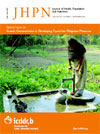
|
The Journal of Health, Population and Nutrition
icddr,b
ISSN: 1606-0997
EISSN: 1606-0997
Vol. 29, No. 6, 2011, pp. 552-559
|
 Bioline Code: hn11069
Bioline Code: hn11069
Full paper language: English
Document type: Research Article
Document available free of charge
|
|
|
The Journal of Health, Population and Nutrition, Vol. 29, No. 6, 2011, pp. 552-559
| en |
Reporting Diarrhoea through a Vernacular Term in Quechua-speaking Settings of Rural Bolivia
Pacheco, Gonzalo Durán; Christen, Andri; Arnold, Ben; Hattendorf, Jan; Colford Jr., John M.; Smith, Thomas A. & Mäusezahl, Daniel
Abstract
Field studies often usecaregiver-reporteddiarrhoeaandrelatedsymptoms to measure childmorbidity.There are various vernacular terms to define diarrhoea that vary across the local cultural contexts. The relationship between vernacular definitions of diarrhoea and symptoms-based definitions is not well-documented. This paper describes the association of the vernacular Quechua term k’echalera with the symptoms-based standard definition of diarrhoea in rural Bolivian settings. During a cluster randomized trial in rural Bolivia, both signs and symptoms of diarrhoea and reports of k’echalera were collected for children aged less than five years. Reported k’echalera were found to be associated with important changes in stool frequency, consistency, and presence of blood and mucus. Reported k’echalera were highly related to three of four recorded categories of watery stool. The intermediate (milk-rice) stool consistency, which fits into the definition of watery stool, was not strongly related to k’echalera. Mucus in the stool was also associated with k’echalera; however, its presence in k’echalera-free days accounted for at least 50% of the possible false negatives. The sensitivity and specificity of the term k’echalera were estimated by Bayesian methods, allowing for both symptoms of diarrhoea and reports of k’echalera to be subject to diagnosis error. An average specificity of at least 97% and the sensitivity of at least 50% were obtained. The findings suggest that the use of k’echalera would identify fewer cases of diarrhoea than a symptom-based definition in rural Bolivia.
Keywords
Definitions; Diarrhoea; K’echalera; Perceptions; Bolivia
|
| |
© Copyright 2011 - Journal of Health Population and Nutrition
Alternative site location: http://www.jhpn.net
|
|
